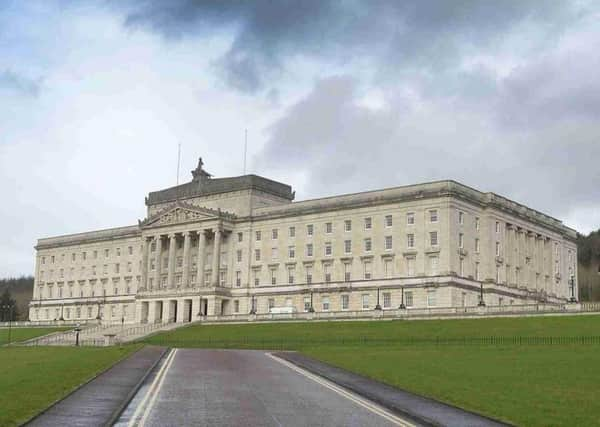NI minister agrees to discuss referendums on abortion and marriage laws


But the offer by Government frontbencher Lord Duncan of Springbank sparked immediate criticism at Westminster, with one peer branding it “most unhelpful”.
The controversy came towards the end of a lengthy debate in the House of Lords on emergency legislation linked to the continuing crisis at Stormont.
Advertisement
Hide AdAdvertisement
Hide AdThe main aim of the Northern Ireland (Executive Formation and Exercise of Functions) Bill is to deal with the governance vacuum created by the collapse of powersharing, and provide breathing space for the region’s rowing politicians to resume negotiations.
But the proceedings were largely dominated by disagreement over an MP-backed move to extend certain human rights protections to Northern Ireland in the absence of a devolved administration.
Elected members approved, in a free Commons vote last week, an amendment to the Bill which would require ministers to issue guidance to Northern Ireland civil servants to ensure compliance with UK abortion and same-sex marriage legislation.
While there was support for the measure from some peers in the upper chamber, others raised concerns arguing that abortion was a devolved issue.
Advertisement
Hide AdAdvertisement
Hide AdDuring the debate, Liberal Democrat peer Lord Alderdice suggested the Northern Ireland Secretary consider holding referendums to gauge the views of the public on the disputed issues.
He said: “What is much more likely to affect Northern Ireland politicians is when their own people start to say things to them.”
Lord Alderdice added: “I believe that dramatic changes are taking place in the views of the people of Northern Ireland on many issues and the only way for us to become clear about that is to put it to the people in a clear fashion.”
Responding, Lord Duncan agreed that “there has been an evolution in the public opinion within Northern Ireland.”
Advertisement
Hide AdAdvertisement
Hide AdOn the “novel idea of referendums”, Lord Duncan said: “I cannot make any commitment on that but I would like to discuss that matter further and if he were amenable I would like to sit down in the future to explore that very thing.
“It is of course not for this particular Bill to move that matter forward.”
But this led to a swift intervention from Baroness O’Loan, who said she had been given a ministerial assurance that the UK Parliament would make no decision on abortion so long as Stormont was “in devolution mode”.
The independent crossbencher, who served as Northern Ireland’s police ombudsman from 1999 to 2007, said: “I do not think it’s helpful for him to suggest there be a referendum on abortion in Northern Ireland at this time of night on this Bill.
“Even to discuss it I think most unhelpful.”
Advertisement
Hide AdAdvertisement
Hide AdLord Duncan said he disagreed and added: “I don’t think in opening up a discussion with Lord Alderdice we are doing anything other than recognising that there are challenges ahead of which this is but one opportunity to progress.
“It is not my intention to state that we will do any more than discuss that, because it is far too great a discussion to have.”
Lady O’Loan earlier had spoken out against the Commons amendment to the Bill, arguing that abortion was not a human right.
Given only the Northern Ireland legislature could make make law in this area, she argued “it must surely be illogical to ask the Secretary of State to issue guidance, which would be incompatible with that law”.
Advertisement
Hide AdAdvertisement
Hide AdTory former lord chancellor Lord Mackay of Clashfern told peers that the Government had no power to change abortion law in Northern Ireland.
He said: “If the law is to be changed, that has to be done by the appropriate legislature.
“It is the (Northern Ireland) legislative assembly that has the power to do this. There is no question of the Secretary of State being able to do it by guidance. That is out of the question.”
Former senior judge Baroness Butler-Sloss argued the change to the Bill agreed by MPs “means absolutely nothing on abortion”.
Advertisement
Hide AdAdvertisement
Hide AdThe independent crossbencher said: “There has been a very well-meaning attempt by members of the House of Commons to circumvent devolution by putting in a clause that I cannot believe they thought would mean anything or would do any good.
“It is the expectation that has been raised that is so sad.”
Labour former Cabinet minister Lord Adonis said: “If Northern Ireland wishes to exercise the prerogatives of devolution, it must operate devolved institutions.”
He added: “If they do not sit and legislate, then we have a duty to legislate in their place, because there is no one else who can do it.”
Advertisement
Hide AdAdvertisement
Hide AdOpposing the amendment, Democratic Unionist Party peer Lord Browne of Belmont said: “What we have here, I rather suspect, is an attempt to change the law through guidance.
“It is proper for those matters to be dealt with by the devolved institutions.”
Highlighting the cross-party majority of MPs that had backed the amendment, Labour leader in the Lords, Baroness Smith of Basildon, said: “The House of Commons sought a way forward which is both proportionate and within the terms of this legislation.”
Lord Duncan said: “We can be fairly clear that this matter most correctly rests with an assembly in Northern Ireland.”
The Bill was approved by peers without amendment and is now set to become law.